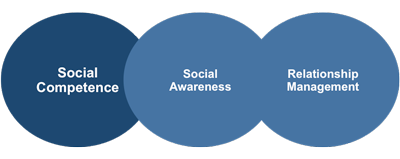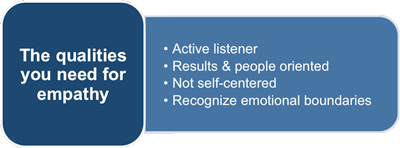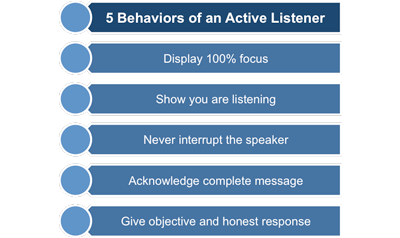Emotional Intelligence and Social Awareness
The second area of EQ development you need to assess and plan for is social competency. This consists of two parts: social awareness and relationship management.
 |
You cannot avoid developing your ability to understand and control your own emotions because these are prerequisites for being able to recognize and understand the emotions of others. It is an expansion of your emotional awareness. The competencies you need to develop to understand the emotions of others include:
• Empathy
• Organizational awareness
• Service orientation.
With good social awareness you can accurately read situations and people because you are able to understand and empathize with their emotions. Management is about getting work done and achieving objectives through other people. If you have poor or no understanding of others and you cannot relate to them you will have difficulty being successful in this role. This Assessing Social Awareness Checklist provides you with a quick and easy way to assess the social awareness aspect of emotional intelligence.
One of the most important people skills for any manager is the ability to empathize with others. This means that you are able to understand and appreciate why someone feels they way they do.
The importance of empathy was explained in Stephen Covey's book The 7 Habits of Highly Effective People. His fifth habit was to seek first to understand, then to be understood. That phrase reflects the simple wisdom of considering the needs of the other party in any communication.
By using the simple technique of the reflective cycle you will learn to identify the feelings of others you interact with and to gain insight into why they feel that way about an event or situation. A great deal of confusion and conflict can be reduced or eliminated by simply taking the time to understand someone else's point of view before trying to convince them with your own message.
 |
There are some factors that tend to prevent us from being able to empathize with others:
• Self-centeredness
• Non-active listening
• Results orientation
• Poor recognition of emotional boundaries.
People are quite naturally self-oriented and anxious to impose their own worldview on others. Furthermore they expect other people to think and act like them. But this attitude is not conducive to working well within teams. You must seek ways to achieve your goals whilst at the same time taking into account the different capabilities, attitudes, and emotions of others needed to attain that goal.
You cannot afford to be self-centered. As a manager you will frequently be persuading those reporting to you to perform tasks in addition to their normal workload or to re-work a completed task for a variety of reasons outside of your control. Your communication needs to show that you empathize with their feelings about this request, but that you still need the task completed.
Reflecting on the words and body language you used in these types of exchanges will enable you to gain an appreciation of how your request was received and reacted to. From these findings you can adapt your communications style to more effectively persuade your team members.
As a manager you are incentivized to get results and achieve end goals so anything you can do to attain this effectively and productively is good. So whilst some may view spending time empathizing with others as contradictory to attaining goals, it is central to a manger's role of creating a motivated, cohesive, and effective team.
An essential skill successful managers develop is their ability to actively listen during their communications. By being able to actively listen and to suspend any prejudgment of the other's point of view you will be able to truly empathize with others.
This is something that many managers reserve for occasions when they are actively coaching rather than something that they do as a matter of course when listening to others. To develop active listening within this capacity of EQ you need to incorporate five simple behaviors into your communications style:
• Display 100% focus
• Show you are listening
• Never interrupt the speaker
• Acknowledge the speaker's whole message
• Give an objective, honest response.
Your behavior must show that you are giving all your attention to the speaker by ignoring all environmental and mental distractions. To be actively listening you must focus on both the words being said and the nonverbal signs that the speaker is giving you.
The person speaking to you will gauge how well you are listening from the gestures, posture, and body language you exhibit during this activity. To be an effective listener it is essential that you let the speaker say their whole message without any interruptions.
 |
A good active listener waits for the speaker to indicate they have presented their complete argument and resists the need to present counter-arguments or jump to conclusions. They will acknowledge and if necessary reflect back to the speaker what they have heard. Their response is objective, respectful, and honest.
These behaviors will ensure that you hear exactly what the other individual has said, and that they know that you have heard what they said. To learn about active listening in greater detail you can download our free Active Listening eBook.
For your social awareness to be effective you must not only be empathetic with others, but be aware of the different emotional boundaries you will encounter in your daily activities at work. This means that you are clear in your own mind as to where your own emotions end and someone else's begin. You are able to recognize and feel the emotions of others without having to adopt their emotions.
If you find yourself adopting the moods of others at the expense of your own emotions then you are likely to be someone who needs to improve their recognition of emotional boundaries. This could be where you have accepted views of others to avoid rocking the boat.
This type of behavior often causes you to be unhappy because you spend so much time trying to fit in that you feel uncomfortable with much of what is being done. At its worst, it can lead to you being afraid to say what you really think even though you are convinced that the group or individual is doing something that is ineffective or fundamentally wrong.
The key concept of emotional boundaries is that you are responsible for your own emotions, not for the emotions of other people. It can be difficult to empathize with others whilst not necessarily sharing their emotions or even feeling that they are valid under the circumstances. It can take a lot of self-control in emotional and stressful situations.
You will need to choose your responses carefully in order to acknowledge the other person's feelings without necessarily buying into them yourself. If you do not respect emotional boundaries you can waste a lot of time trying to change the feelings of other people when this is beyond your control.
The second part of social awareness is your ability to understand the structure and workings of your organization.
'The ability to read the current of emotions and political realities in groups.'
This is how Goleman described organizational awareness in his book Primal Leadership, published in 2002. This was not part of his original model of emotional intelligence. In practical terms organizational awareness means your ability to understand your organization's structure and operational processes, inner workings, including how things are achieved informally.
In addition, it means your ability to understand the organizations of your clients and vendors, understand these organizations' business objectives and operations, and act with your client's best interest in mind.
 |
There are two main aspects of organizational awareness that Goleman discusses: identifying key power relationships and understanding the values and culture of the organization. The former involves accurately recognizing the individuals who have power and political influence in your organization.
This means you knowing 'who' the real decision-makers are even if they do not appear to have any official responsibility. You need to ask yourself the following questions to identify these personnel:
• Who has influence on the decisions made?
• Who has the power to say 'yes'?
• Who has the power to say 'no'?
• Who takes advice from whom?
• What are the significant personal relationships between individuals?
By systematically answering these queries you will be able to evaluate the key power relationships within your organization. This knowledge alone is not sufficient for a high EQ; you also need to be aware of an organization's precise culture and values to gain real insight into its workings.
This knowledge comes from first-hand interaction with and experience of your own organization and those of your clients or vendors. You can also gain a significant insight into an organization by reading what it says in its annual reports and marketing material and on its website.
Sometimes, however, there is discrepancy between what the organization says about itself and what is actually happening on a day-to-day basis. The most accurate way to evaluate the culture and values of an organization is to look at the recognition and reward system. In particular you should ask yourself:
• Who gets promoted and why?
• What behavior gets rewarded?
• What behavior gets punished?
• How does the organization react to problems or challenges?
• What happens when mistakes are made?
• Are there written or unwritten rules about starting or working late?
• Are there rules about telling the truth?
• What does it take to succeed in the organization?
• Who gets fired and why?
Answering these questions can cut through the organization's PR and make clear its real priorities. Some organizations are notorious for elevating revenue earning potential above everything else. In some instances this means laying-off staff who cannot be placed on billable work for any period of more than a few weeks. Other organizations seem to promote people on the basis that they have managed to create a problem, which they then proceed to fix with as much drama as possible.
You need to fully understand an organization in terms of what it states to be its values and culture and by observing how these translate into operational actions. Armed with this knowledge you will be able to fit into its culture and be successful.
The final area of EQ social awareness is that of an individual being service oriented. It is only by understanding and being empathetic with another's circumstances, including the influences of their organization, that you are able to fully comprehend their 'true' needs. This knowledge enables you to act in a way that suits the other person's best interests.
Within your own organization this is the level of emotional understanding you need to have with each of your team to ensure that they are both satisfied and motivated. This is why the appraisal process is such a key aspect of your successful management of a team. For example,
You discover a member of your team no longer feels challenged in their role. By questioning the individual you find out that he feels overlooked, ignored, and disregarded by the organization.
Using your EQ skills you are able to use your knowledge of the organization and its culture and empathize with his feelings to create a workable resolution. This could be:
• Devising a training plan that equips the team member with new skills
• Seeking opportunities to delegate additional responsibilities that utilize these new skills
• Offering support for gaining qualifications or identifying new development opportunities
• Using the team member's existing skills to train others on the team
• Appraising his or her current performance to identify if any areas could be improved on.
Everyone wants their efforts to be truly valued and appreciated. When individuals recognize their manager giving them this type of service orientation they will be satisfied and motivated. Emotions will run high if people feel they are treated with contempt, or disparaged or ignored, and reductions in efficiency and performance will occur.
The time you spend using your EQ to ensure that you know and show your appreciation of your team members' efforts is minimal when compared to how hard you will have to work to turn around an under-perform ing team. This immediate investment in your team has long-term pay-back when working to attain goals.
You may also be interested in:
Developing Emotional Intelligence | Self-Awareness | Self-Management | Relationship Management | Emotional Intelligence, Communication, and Coaching | Emotional Intelligence, Change, Conflict, and Leadership.



